Serving 1,590 students in grades 9-12, Grand Junction High School ranks in the top 50% of all schools in Colorado for overall test scores (math proficiency is top 50%, and reading proficiency is top 50%).
The percentage of students achieving proficiency in math is 27% (which is lower than the Colorado state average of 32%). The percentage of students achieving proficiency in reading/language arts is 54% (which is higher than the Colorado state average of 45%).
The student:teacher ratio of 19:1 is higher than the Colorado state level of 15:1.
Minority enrollment is 32% of the student body (majority Hispanic), which is lower than the Colorado state average of 50% (majority Hispanic).
Quick Stats (2025)
- School Type: Online School
- Grades: 9-12
- Enrollment: 1,590 students
- State Accredited: No
- Live Instruction: Yes
- Rolling Enrollment: No
- Student:Teacher Ratio: 19:1
- Minority Enrollment: 32%
- Graduation Rate: 85% (Top 50% in CO)
- Overall Testing Rank: Top 50%
- Math Proficiency: 27% (Top 50%)
- Reading Proficiency: 54% (Top 30%)
- Science Proficiency: 23% (Btm 50%)
- Source: National Center for Education Statistics (NCES), CO Dept. of Education
School Overview
Grand Junction High School's student population of 1,590 students has stayed relatively flat over five school years.
The teacher population of 84 teachers has declined by 5% over five school years.
School Type
Grades Offered
Grades 9-12
Total Students
1,590 students
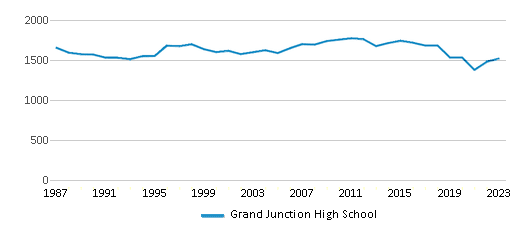
Gender %
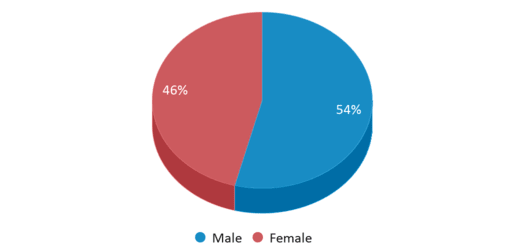
Total Classroom Teachers
84 teachers
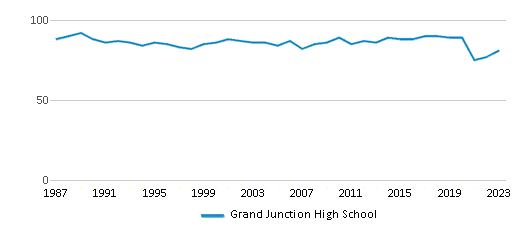
Students by Grade
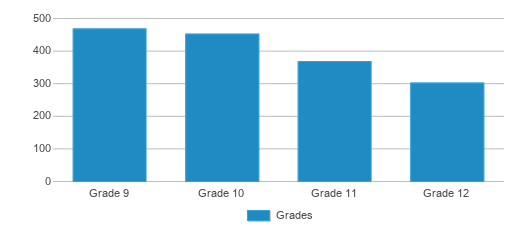
State Accredited Program
No
Personalized Content
No
Live Instruction
Yes
Rolling Enrollment
No
Flexible Class Schedule
No
Accelerated Offerings
No
Classes for Credit/Part Time Options
No
Dedicated College Counselor
No
Tutoring/Mentoring
Yes
Community Clubs/Activities Offered
No
School Calendar
School Rankings
Grand Junction High School ranks within the top 50% of all 1,779 schools in Colorado (based off of combined math and reading proficiency testing data).
The diversity score of Grand Junction High School is 0.48, which is less than the diversity score at state average of 0.62. The school's diversity has stayed relatively flat over five school years.
Overall Testing Rank
#706 out of 1779 schools
(Top 50%)
(Top 50%)
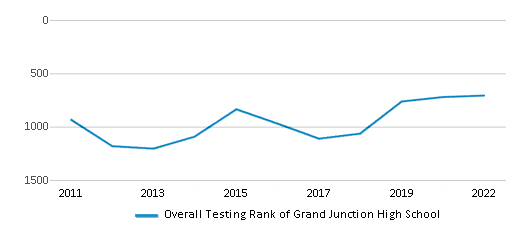
Math Test Scores (% Proficient)
27%
32%
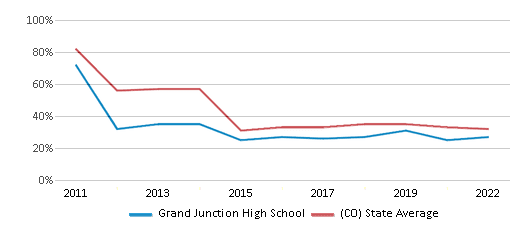
Reading/Language Arts Test Scores (% Proficient)
54%
45%
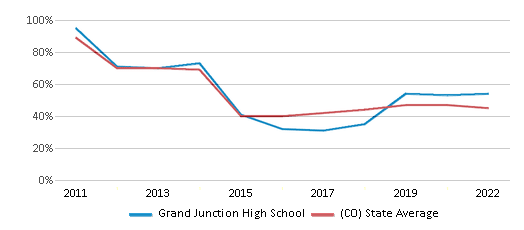
Science Test Scores (% Proficient)
(20-21)23%
29%
Student : Teacher Ratio
19:1
15:1
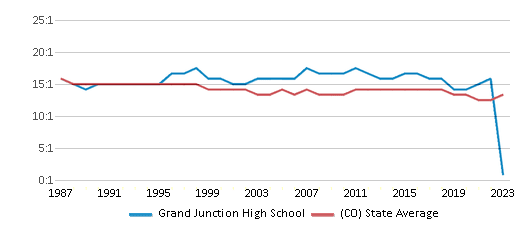
American Indian
n/a
1%
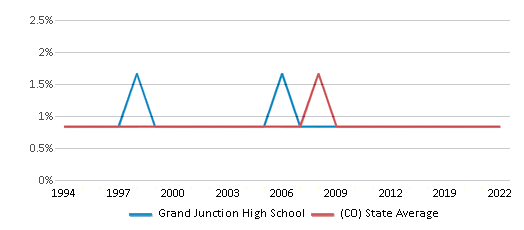
Asian
2%
3%
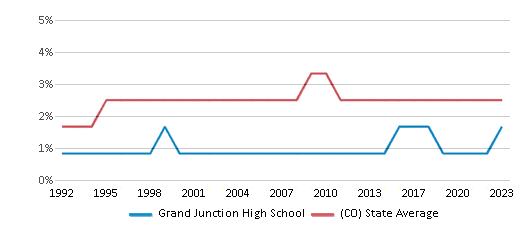
Hispanic
25%
36%
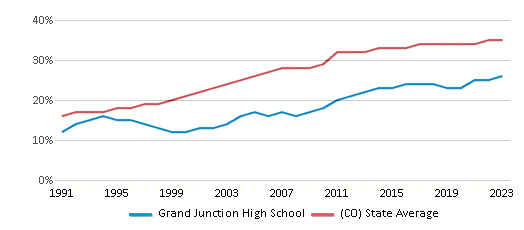
Black
1%
5%
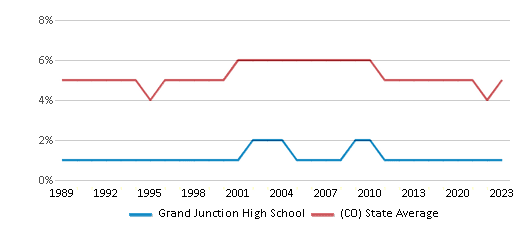
White
68%
50%
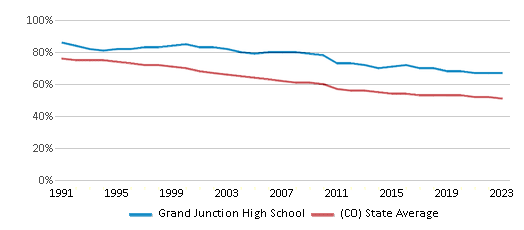
Hawaiian
n/a
n/a
Two or more races
4%
5%
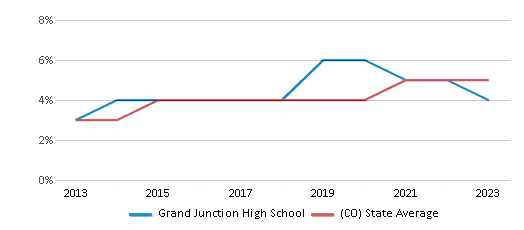
All Ethnic Groups
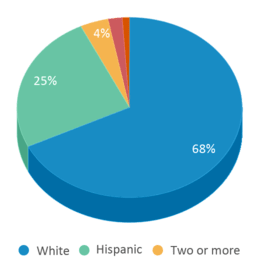
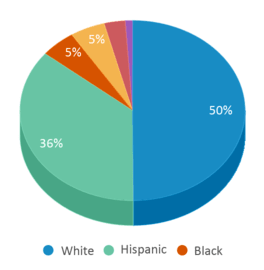
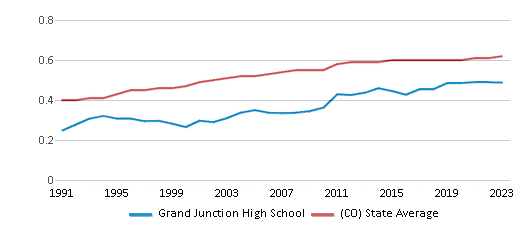
Graduation Rate
85%
82%
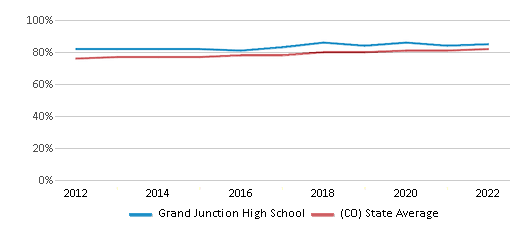
Eligible for Free Lunch
40%
39%
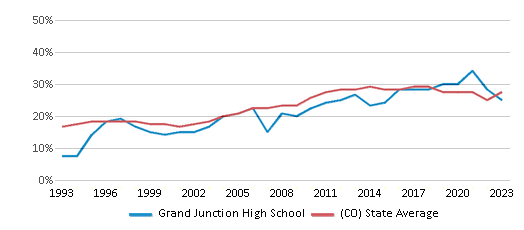
Eligible for Reduced Lunch
8%
6%
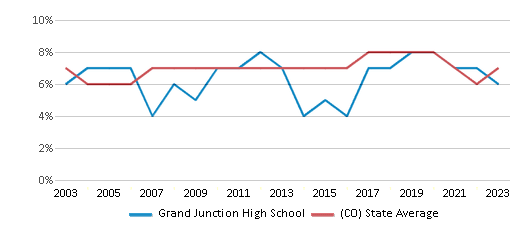
School Statewide Testing
School District Name
Source: National Center for Education Statistics (NCES), CO Dept. of Education
Profile last updated: 02/09/2025
Frequently Asked Questions
What is Grand Junction High School's ranking?
Grand Junction High School is ranked #706 out of 1,779 schools, which ranks it among the top 50% of public schools in Colorado.
What schools are Grand Junction High School often compared to?
Grand Junction High Schoolis often viewed alongside schools like Fruita Monument High School, Central High School, Palisade High School by visitors of our site.
What percent of students have achieved state testing proficiency in math and reading?
27% of students have achieved math proficiency (compared to the 32% CO state average), while 54% of students have achieved reading proficiency (compared to the 45% CO state average).
What is the graduation rate of Grand Junction High School?
The graduation rate of Grand Junction High School is 85%, which is higher than the Colorado state average of 82%.
How many students attend Grand Junction High School?
1,590 students attend Grand Junction High School.
What is the racial composition of the student body?
68% of Grand Junction High School students are White, 25% of students are Hispanic, 4% of students are Two or more races, 2% of students are Asian, and 1% of students are Black.
What is the student:teacher ratio of Grand Junction High School?
Grand Junction High School has a student ration of 19:1, which is higher than the Colorado state average of 15:1.
What grades does Grand Junction High School offer ?
Grand Junction High School offers enrollment in grades 9-12
What school district is Grand Junction High School part of?
Grand Junction High School is part of Mesa County Valley School District No. 51.
School Reviews
2 1/29/2020
This school is a way to populate, as well as the crime since 2016 has been extremely scary. Lockdowns are frightening, as well as how disgusting the school generally is. The walls are falling apart; the floor is cracking, and the choir room literally had a mouse inside of the classroom, running across. There was one in the band room as well. I do not recommend this school for people's children, but I do accept the teachers. The teachers are extremely caring and helpful. For the student body, however, things need to be safer for students.
5 9/24/2016
This school is pretty good, better than my old school. It may not seem very diverse, but it is accepting of different races and sexuality. It also offers a very good variety of electives, and handles extra credit well. Some of the teachers are not so great, but what can you do? This school has a lot of spirit!
Review Grand Junction High School. Reviews should be a few sentences in length. Please include any comments on:
- Quality of academic programs, teachers, and facilities
- Availability of music, art, sports and other extracurricular activities
Recent Articles

What Is A Charter School?
Explore the world of charter schools in this comprehensive guide. Learn about their history, how they operate, and the pros and cons of this educational innovation. Discover key facts about charter schools, including admission policies, demographics, and funding, as well as what to look for when considering a charter school for your child.

10 Reasons Why High School Sports Benefit Students
Discover the 10 compelling reasons why high school sports are beneficial for students. This comprehensive article explores how athletics enhance academic performance, foster personal growth, and develop crucial life skills. From improved fitness and time management to leadership development and community representation, learn why participating in high school sports can be a game-changer for students' overall success and well-being.

February 05, 2025
Understanding the U.S. Department of Education: Structure, Impact, and EvolutionWe explore how the Department of Education shapes American education, from its cabinet-level leadership to its impact on millions of students, written for general audiences seeking clarity on this vital institution.









